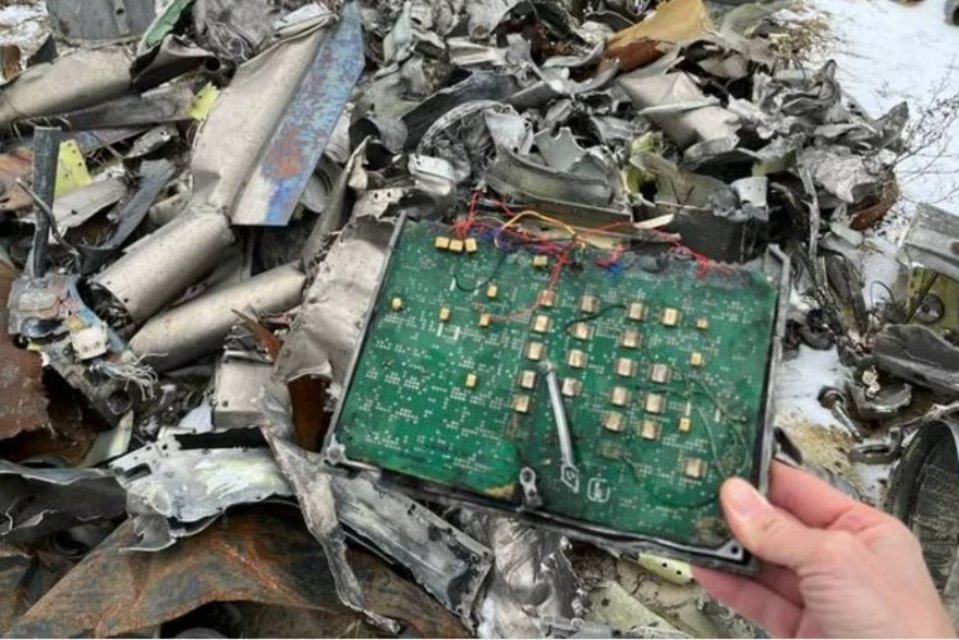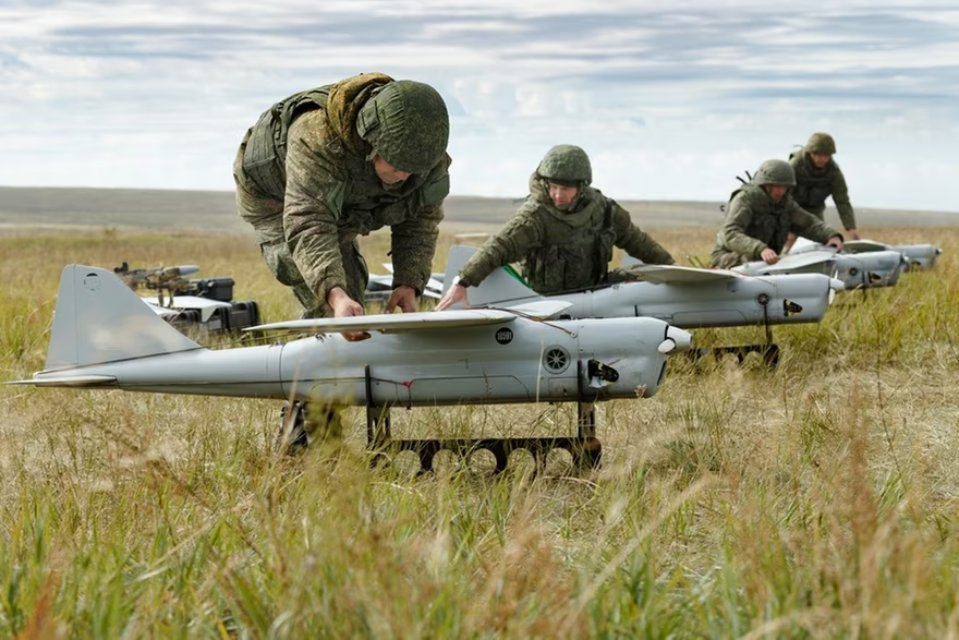Sanctions or no sanctions, Swiss electronic chips and precision machinery continue to be exported to Russia, according to an investigation conducted by the Italian public service broadcaster RSI. Customs records show that they are passing through China and Turkey in particular.
Swiss chips in Russian missiles and war drones used against Ukraine
In the Donbas, a Swiss chip was uncovered. It outfitted the Russian reconnaissance drone Orlan, which was used to alert Kremlin artillery to Ukrainian positions. This electrical component is manufactured by U-blox, a Zurich-based firm that is a world leader in the automotive and medical areas.
RSI analyzed video and photographic evidence of this discovery, as well as two more examples of Russian drones using the chip in Ukraine. When asked, U-blox stated, “We have been following a rigorous policy that prohibits our customers from directly or indirectly selling our products for military or weapons applications since 2022.”
We could reconstruct the first step of the trip these chips took. The Zurich-based corporation marketed them to civilian participants in Eastern Europe and Russia in 2012, 2015, and 2019. Then they vanish, only to reemerge in Russian weaponry. How did these chips end up connecting drones to the Russian GPS?
“One possibility for how these chips ended up in a Russian military system is that they were removed from commercial products, such as electric bikes or cars, and then installed in these drones,” explains Stefan Zizala, CEO of U-blox. To avoid this type of dynamic, we track the distribution chain as carefully as possible. But if a customer’s client breaks these restrictions, we have no method of stopping them.”
Despite sanctions, chips are delivered to Russia through Asia
Before the war, such components may be sent to Russia for civilian use. But not in the military. The Swiss Confederation had outlawed its direct shipment to Moscow since March 4, 2022, when Russia invaded Ukraine. They are regarded as strategic and vital to the Kremlin’s arsenal.
They should never have ended up in Russia. Despite the sanctions, the flow has continued, according to the RSI, which uses aggregated customs data.
It demonstrates that five Chinese companies shipped at least 14 shipments of “non-military” equipment, including GPS/Glonass satellite system modules, from the firm U-blox. This will be done from May 26, 2022, to September 28, 2022, for a total of $90,000.
According to its website, the firm SMT-ILogic was “founded in 2015 by a group of highly qualified specialists in the field of telecommunications and microprocessor technology, with many years of experience and close ties to major component producers.”
Journalistic investigations by Reuters, IStories, and the Royal United Services Institute (RUSI) reveal that another Russian firm, Special Technology Center (STC), based in St. Petersburg, is behind SMT-ILogic. This is the company that makes the Orlan drones.
Russian drones composed of Western components
According to international media sources, the two companies previously shared some co-owners, but “then the obvious connection was severed.” The Orlan reconnaissance drone is almost entirely composed of Western, primarily American, components.
Since 2016, the STC firm has been under sanctions by the same United States for “assisting the GRU (the Russian military intelligence service) in its electronic intelligence activities.” Sanctions that the Confederation decided to impose exclusively on January 25.
On paper, Chinese enterprises are thus responsible for sales in Russia. A closer look reveals something else. “Many of these companies are Russian: they are founded and registered by Russian citizens,” argues Denys Hutyk, director of the independent research center Economic Security Council of Ukraine.
“We discovered that at least two of these Chinese companies are front companies for the main Russian manufacturer of the Orlan drone.” This is the trend.”
Dual civilian and military use
In addition to the chips, the RSI discovered hefty precision machinery “made in Switzerland” being exported to Russia. These include weapons essential to Vladimir Putin’s war machine. They were imported into Russia by Galika AG of Zurich, a subsidiary of a Swiss business that has been involved in this sector for over 40 years.
Customs statistics obtained by the RSI from specialized aggregators show that Galika’s Russian business shipped 382 machine tools, spare parts, and precision instruments. This was from March 4, 2022 – the same day as the introduction of international sanctions against Russia, which Switzerland adopted, to February 1, 2023. The declared worth of the goods is $2.2 million.
GF Machining Solutions and Konstruktorskoe Buro Priborostroeniya
A machine tool from the Swiss firm GF Machining Solutions in Losone, Ticino, is also among the shipments. It is reported to be the Mikron HPM 600 HD model, worth $220,000 and designed for the universal fabrication of high-quality metal parts for non-military usage.
A Turkish corporation is believed to have sold it to Galika’s Russian subsidiary. For the government or the private sector? The machine’s eventual installation has yet to be discovered.
In 2018, 23 devices of the same model were given – once again by Galika – to JSC Konstruktorskoe Buro Priborostroeniya, one of the major Russian defense industries situated in Tula, about 200 kilometers south of Moscow.
This company develops high-precision weaponry systems for Putin’s armed forces, as well as anti-aircraft defense systems, high-rate artillery, and small arms. Since 2014, a state entity has been sanctioned by the United States, but not from Switzerland.
When questioned by the IHR multiple times, GF Machining Solutions refused to answer any questions about specific shipments. SECO, the State Secretariat for Economic Affairs, is in a similar dilemma, declining to comment on the authorizations for machinery now in the hands of the Russian arms industry.
GF Machining Solutions denies having “direct business dealings with Russia”.
GF Machining Solutions blames the commercial intermediary that represented it in Russia: “All business was conducted by our former distributor Galika.” According to GF Machining Solutions, the commercial connection “ended with the beginning of the Russian invasion in Ukraine.” Galika AG declined to respond.

Missiles and allegations of war crimes
Large Swiss-made machinery on the one hand, Swiss electronic chips in drones and even Russian missiles on the other.
In Ukraine, in graveyards, there are fields of warheads, metal cylinders, and barrels of S-300 missiles, all reduced to scrap metal after wreaking havoc on homes and infrastructure and spreading death in the area. The IHR proceeded there, escorted by Dmytro Chubenko, the Kharkiv region prosecutor’s spokesman. On the site, he has shown circuits with western components.
Evidence of alleged Russian war crimes against Ukrainains is kept. More than a thousand missiles have been mentioned in this article. Weapons that, according to Dmytro Chubenko, “caused more than 1600 deaths and more than 2500 injuries in the Kharkiv region.
The analysis concentrates on metal components and electrical chips, which have been entrusted to experts from the Ministry of Defense to trace the producer countries. Switzerland is included.
Semiconductors from at least two Swiss businesses have been reported on the Kalibr and Iskander missiles: STMicroelectronics in Geneva and Traco Power in Baar (Canton of Zug). However, as demonstrated by the Nako (Independent Anti-corruption Commission), a civil society group in Ukraine, the United States is at the forefront in this field.
ST Microelectronics and Traco Power have repeatedly declined to be interviewed and have only issued official comments. Both say, among other things, that they have ceased all sales, exports, and activity in Russia following the sanctions imposed upon the start of the invasion.
“We regret and are shocked by the discovery of electronic components bearing our logo that have been improperly used in military equipment,” Traco Power says.
“We do not allow or tolerate the use of our products for purposes other than their intended purpose,” STMicroelectronics declares.
One year was not sufficient to stop fuelling Putin’s war machine
Many issues remain about the role of Swiss and Western firms and organizations. There are calls to corporations to bear more responsibility for the items they export, which are then used in Russian deadly weapons. It is also urged that flaws in export restrictions be addressed.
As Putin’s war machine continues to operate, Ukrainians and the whole civilized world can’t wait longer to prevent all Western components used in the Russian missiles from being shipped to the Moscow regime.
Switzerland continues to manufacture microprocessors that can be used in Russian weapons. In one way or another, they finished by being supplied to Russia, and then they helped Putin’s army kill civilians in destroyed cities in Ukraine.
It’s sick to see it happening more than one year after Putin’s regime started the war. It should have been enough to find a mechanism to block all shipments to Russia.

